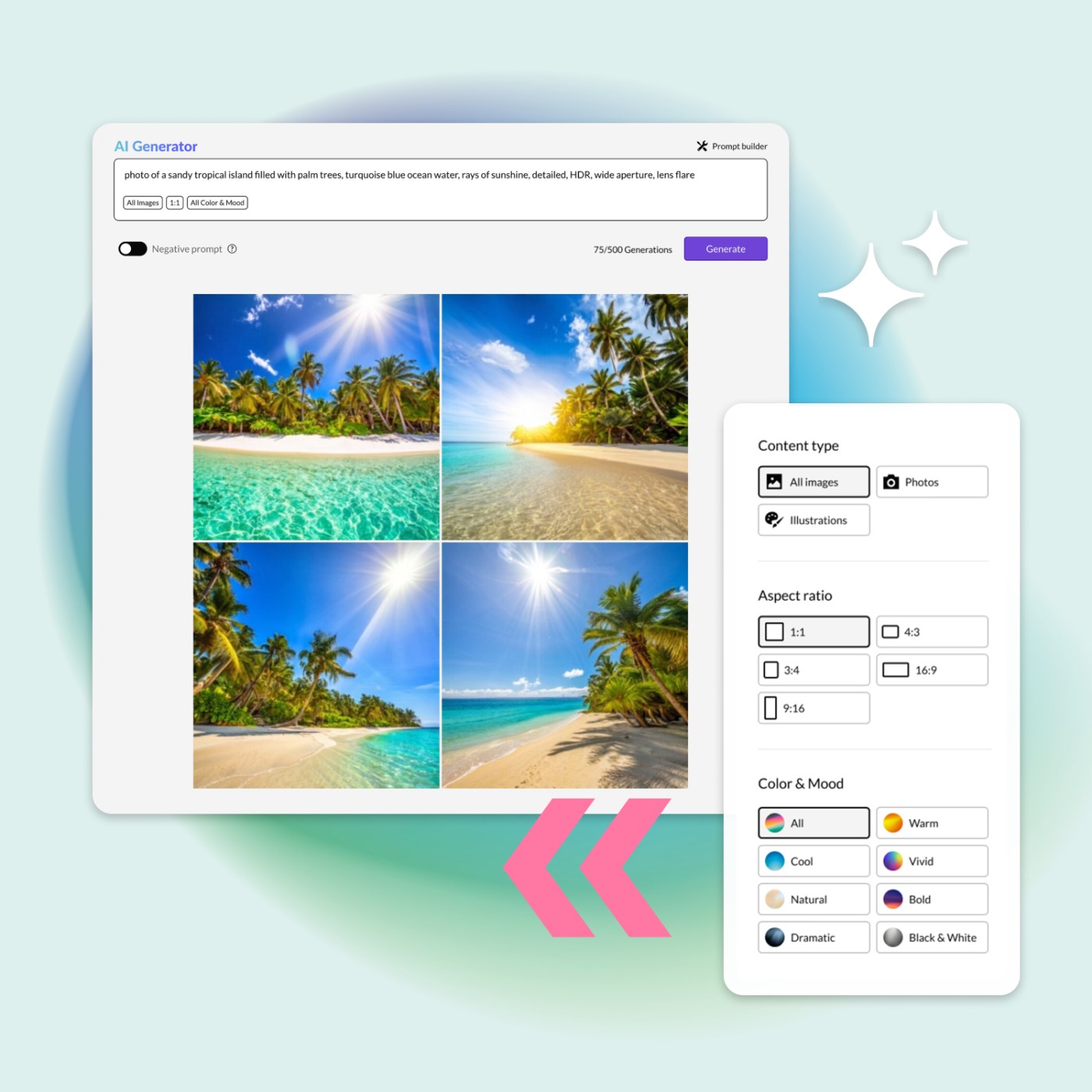Getty Images launches an AI-powered image generator
Getty Images, one of the largest suppliers of stock images, editorial photos, videos and music, today announced the launch of a generative AI art tool that it claims is “commercially safer” than other, rival solutions on the market.
Called Generative AI by Getty Images, the tool — powered by an AI model provided by Nvidia, with whom Getty has a close technical partnership — was trained on a portion of Getty’s vast library (~477 million assets) of stock content. Along the lines of popular text-to-image platforms like OpenAI’s DALL-E 3 and Midjourney, Getty’s tool renders images from text descriptions of the images, or prompts — e.g. “photo of a sandy tropical island filled with palm trees.”
Customers creating and downloading visuals using the tool will receive Getty’s standard royalty-free license, Getty says, which includes indemnification — i.e., protection against copyright lawsuits — and the right to “perpetual, worldwide, nonexclusive” use across all media.
The tool isn’t completely unfettered, however.
While Getty’s content library includes depictions of public figures, Getty says that it’s imposed safeguards to prevent its generative tool from being used for disinformation or misinformation — or from replicating the style of a living artist. For example, the tool won’t let a customer create a photo of Joe Biden in front of the White House or a cat in the style of Andy Warhol, reports The Verge, which had access to the tool ahead of its release. And all images created by the tool contain a watermark identifying them as AI-generated.
“We’ve worked hard to develop a responsible tool that gives customers confidence in visuals produced by generative AI for commercial purposes,” Craig Peters, CEO at Getty Images, said in a press release.

Getty Images AI art generation tool, available soon, was trained on stock images from the massive and growing Getty library. Image Credits: Getty Images
Getty says that content generated by its tool won’t be added to its content library for others to license (but reserves the right to retrain its model using those images) and that Getty contributors whose works are used to train the underlying model will be compensated. Getty will also share revenues generated from the tool, it says, allocating both a per-file proportional share and a share based on traditional licensing revenue.
“On an annual recurring basis, we will share in the revenues generated from the tool with contributors whose content was used to train the AI generator,” a Getty spokesperson told TechCrunch via email. “There will be a set formula based on a number of different factors, and accordingly each contributor will receive different payments in connection with the tool.”
The tool can be enabled on Getty’s website or integrated into apps and websites through an API, and soon, customers will be able to customize it with proprietary data to create images consistent with a particular brand style or design language. Pricing will be separate from a standard Getty Images subscription and based on prompt volume, Getty says.
“We’ve created a service that allows brands and marketers to safely embrace AI and stretch their creative possibilities, while compensating creators for inclusion of their visuals in the underlying training sets,” Grant Farhall, chief product officer at Getty, said in a canned statement.
Prior to the launch of its own tool, Getty had been a vocal critic of generative AI products like Stable Diffusion, which was trained on a subset of its image content library. Earlier this year, Getty sued AI startup Stability AI, which was involved with the creation of Stable Diffusion, for allegedly copying and processing millions of images and associated metadata owned by Getty without informing or compensating Getty contributors.
Peters has previously compared the current legal landscape in the generative AI scene to the early days of digital music, where companies like Napster offered popular but illegal services before new deals were struck with license holders like music labels. “We think similarly these generative models need to address the intellectual property rights of others, that’s the crux of it,” he told The Verge in an interview in January. “And we’re taking [legal] action to get clarity.”
Some companies developing generative AI tools, including Stability AI, argue that their content scraping practices are protected by fair use doctrine — at least in the U.S. But it’s a matter that’s unlikely to be settled anytime soon.
Getty isn’t the only company exploring “safer,” more ethical approaches (in the commercial sense) to generative AI, it’s worth noting.
AI startup Bria offers a generative AI art tool trained on content that Bria licenses from partners, including individual photographers and artists, as well as media companies and stock image repositories, which receive a portion of the company’s revenue. Recently launched avatar creator Ascendant Art, meanwhile, is promising to pay royalties to the artists who voluntarily submit their artwork to train its models.
It’s not just startups. Getty Images rival Shutterstock reimburses creators whose work is used to train AI art models. Adobe, meanwhile, says that it’s developing a compensation model for contributors to Adobe Stock, its stock content library, that’ll allow them to “monetize their talents” and benefit from any revenue its generative AI technology, Firefly, brings in.



